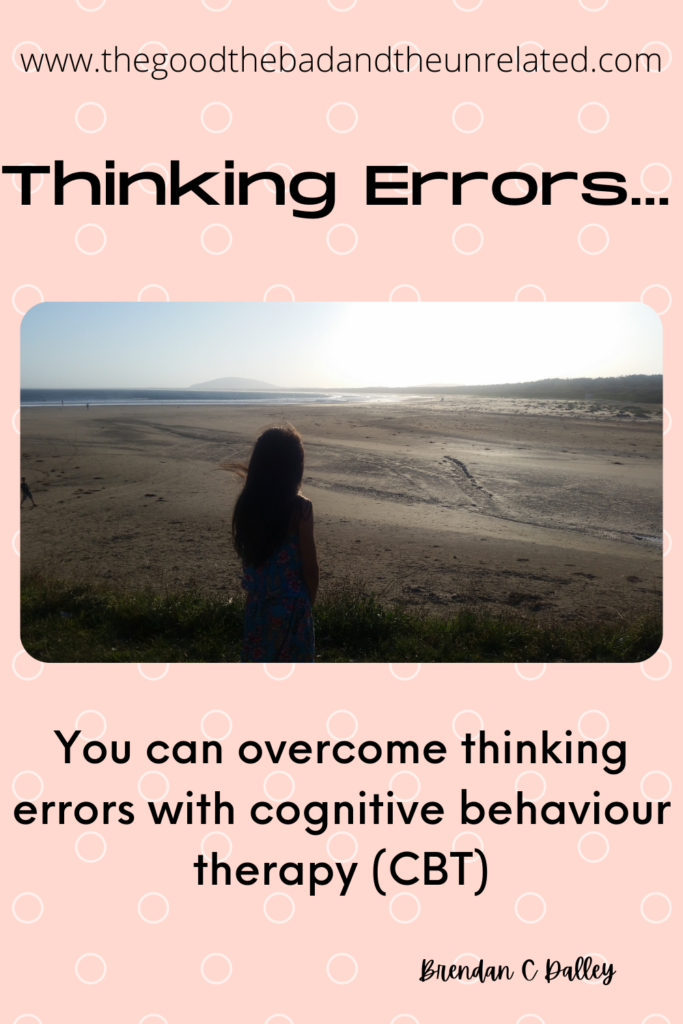The thing about young children is that they genuinely believe they are the centre of the universe. Anyone who has ever been a parent will confirm that their child had a self-centric view of the world, and understandably so. Children need to be fed, protected and guided and this process takes up much of their parents attention. Eventually though, most of us learn that our point of view is only one of many and we realise we need to consider others as well as ourselves. This is the ability to alter our perception.
If a person refuses to listen to others or won’t try to understand their point of view, we might rightly call that person selfish. If, after a period of time, that person refuses to consider others, we may decide to move on because their behaviour is damaging. We can’t, however, move on from ourselves. This is why it is important to both understand common thinking errors and be able to recognise them in ourselves.
Faulty thinking
In the case of children, it is part of the natural process of maturing that they inevitably move from a self-centric world view to include others as well. If an adult still behaves like a three year old, as the saying goes, then that person is clearly exhibiting faulty thinking. The problem with faulty thinking, though, is that it has many guises and not all of them are as obvious as blatant selfishness.
If a person accepts their own position in any given situation, one hundred percent of the time, we might label that person as deluded. It would be unfair to label them as selfish, because every inner voice is very convincing. It is natural to believe the innate stories we tell ourselves, right or wrong. A Psychologist might call these unchallenged thoughts ‘thinking errors’. Before anyone gets all defensive, let me say that we have all been guilty of faulty thinking at one point or another. That said, I figured a short definition of the obvious ones was in order.
All or nothing/ Black and White Thinking
This thinking mistake is fairly obvious from the title and is a favourite of perfectionists. Basically this error states that everything has to be perfect or not attempted. That nothing less than the best will do in any situation. The person that indulges in this sometimes extreme thought process, will refuse to accept that a character is made up of both positive and negative qualities. When something bad inevitably happens, they may fall back on thoughts like “I never do anything good enough…the world is out to get me…it is all too hard”etc. The end result of this process is either making everything you do stressful or not trying anything at all to avoid perceived failure.
An example of this is the person who will not have their friends over unless the house is perfect. They doubt that their friends will accept a messy house, because they don’t themselves. They do not accept that life is sometimes messy. Instead of friends coming over being a positive thing, it becomes stressful and full of self-judgement.
Catastrophising
This is a personal favourite of mine. Catastrophising is when we wrongly assume that the worst possible outcome in a given situation will occur. We unrealistically assume the worst, without any evidence to back us up.
Making a simple mistake at work is a common example. People often assume that because they have made a simple error, they will be ridiculed, fired or both, when common sense indicates that in most cases, this rarely happens. Another example comes in relation to our health. After a blood test, we receive a message to call our Doctor back. Before we make the call, we assume we have cancer, our heart is failing and we are pre-diabetic. In many cases it is a simple courtesy call, but we have thought it up into something it isn’t, causing great stress. On rare occasions, the worst does happen, but for the vast majority of the time, it is not so serious.
Magnification
We have all heard of the phrase ‘blowing something out of proportion’. This is essentially magnification. As the scientific term indicates, magnification is simply making something seem more important, or more damaging than it really is.
Have you ever watched a sporting contest on television and seen the way some coaches ‘blow up’ at their players for the simplest errors? They have taken something small and made it out to be huge by carrying on like a pork chop about it. We all feel this at times, especially when something is really important to us. Our child forgets to do their homework once, and all of a sudden in our minds they will be unemployed and homeless by the time they are eighteen.
Mind reading
At various times in my life, often when being interviewed for a job or asking a girl out, I truly believed I knew what they were thinking. Generally I was wrong, but it never stopped me second guessing people without proof. This is mind reading.
The problem with mind reading is that when we think we know the negative result coming, often we behave in such a manner as to bring about that conclusion. The classic example concerns the job interview. If you really want the job, you convince yourself they don’t like you and then interview in such a way as to confirm that outcome.
Minimisation
At the negative end of the spectrum is the error of magnification, whilst at the positive end, there is the error of minimisation. Whenever someone praises you for a job well-done, minimisation is the reaction to downplay what you have achieved. You end up giving the praise to others or simply not believe the praise given… Did someone say low self esteem?
Over-generalisation (This always happens to me)
When something goes wrong, as things tend to do occasionally in our world, it is easy to fall into the trap of assuming that it always happens. Over-generalising is when we wrongly decide that ‘this always happens to me’. Other versions of this include ‘I always stuff up’ and ‘nothing ever goes right’.
We take a one off or an isolated incident and apply the outcome to the rest of our lives. A good example of this is when a friend cancels a date for a legitimate reason and we end up labelling ourselves as a ‘Nigel no friends’ or a ‘loser’.
There is hope in recognition
Thinking errors are common and completely human. Everyone has them at some point or another, and everyone has a favourite. The good news though, is that learning to recognise when you are doing them, is a huge first step to firstly challenging and eventually overcoming them.
Cognitive Behaviour Therapy – Kryptonite for thinking errors
Cognitive Behaviour Therapy (CBT) offers great insight into these thinking errors and provides many activities to help you recognise and challenge faulty thinking. I will include some links to examples of these activities below.
As always, a Psychologist is ideal for learning this, but there are some very helpful books on the subject to aid you. The one that I relied on a lot and can highly recommend is Change Your Thinking by Sarah Edelman PhD. This book is written in easily accessible language and offers many practical steps to improve your life.
- Learn to recognise when you are making thinking errors.
- Label them to help you become familiar with them.
- Challenge them with CBT.
- Break free.
Links
How regret can inspire positive change » The Good The Bad and The Unrelated
Change Your Thinking, 3rd Edition by Sarah Edelman | 9780733332241 | Booktopia



lovely blog
Thankyou lovely fellow
I’ve been following a therapist on youtube and she uses the great analogy of a house. She said when you were a child you were like a house, your parents and teachers hung decorations here and there on the walls and added pieces of furniture. When you become an adult you can change those decorations, you don’t have to keep them if you don’t like them. She said a lot of people get stuck and say the same things over and over to themselves that aren’t true. You can add new decorations and change that inner voice that makes us “catastrophize” or “minimize’ or “mind read”. I still have lots of work to do but that helps me put it into perspective.
That is a great analogy. Thanks for your thoughtful comment. All the best to you.
Very interesting read. It’s fascinating to look at how we process information, we usually don’t pay attention to this.
So true. Its great to recognise the faults so we can understand them.
Very thoughtful & helpful. We all do this or parts of it to some degree. If only we were aware earlier in our lives 🙂
Absolutely. I wish I knew all this 30 years ago as you will remember.
Very helpful. We all need to realize how out thought make us see think differently.
So true, Cassandra. Thanks for the comment.
Pingback: Faulty thinking: Change the conversation » The Good The Bad and The Unrelated
Very thoughtful piece of writing. I need to remind myself constantly about the way I think. Thanks Brendan. 👍
Sue, me too!
Pingback: Clean distress versus dirty distress » The Good The Bad and The Unrelated